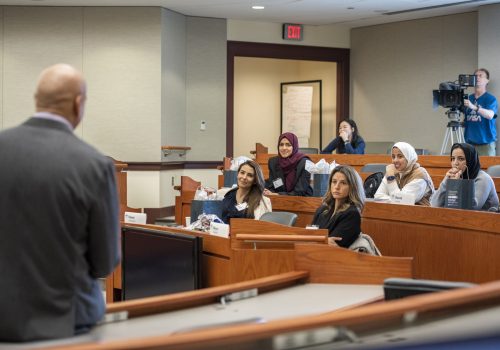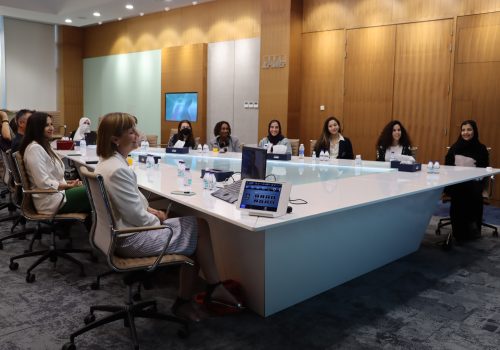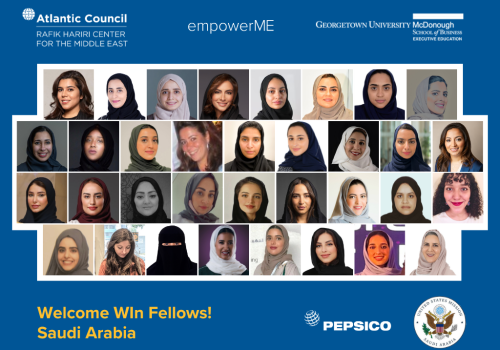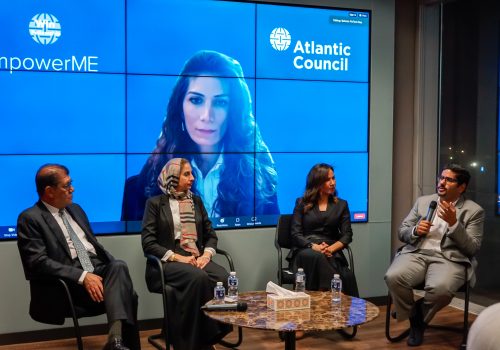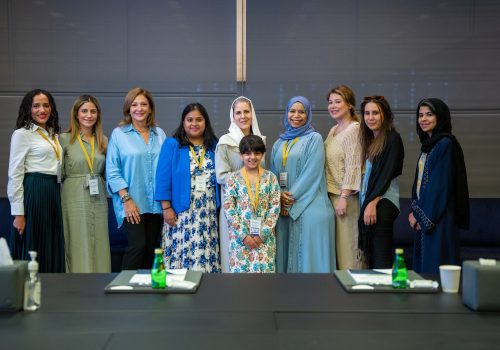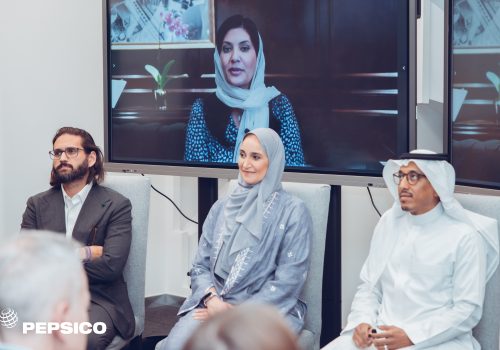Transforming Saudi Arabia’s digital landscape through empowering women entrepreneurs
The Women Innovators (WIn) Fellowship, part of the Atlantic Council’s empowerME initiative, hosted a workshop on Monday, January 29. The event delved into the transformative power of digital technology in Saudi Arabia’s startup ecosystem, exploring its impact on women entrepreneurs and the nuanced challenges and opportunities that women face in this evolving landscape.
Diana Korayim, chairwoman of the Women in Business Committee at the American Chamber of Commerce in Saudi Arabia, delivered the welcoming remarks. The event featured a moderated discussion led by Maha Akeel, faculty lecturer at Dar Al-Hekma University, and included insights from Mohammed Aldossary, co-founder and CEO of Sary; Sarah Al-Husseini, head of government affairs and public policy for Saudi Arabia at Google; Manal AlNemari, consultant of digital health transformation at the Saudi Arabia Ministry of Health; and Saima Jabeen, research fellow at the AI Research Center at Alfaisal University.
Amy Archibald, counselor for economic affairs at the US Embassy in Riyadh, delivered the closing remarks, showing gratitude for the WIn Fellowship’s work with the U.S. Embassy in Riyadh in working toward the embassy’s objectives of economic diversification, economic growth, and women’s empowerment across sectors in Saudi Arabia. Archibald echoed the panelists’ acknowledgment of the challenges faces by women entrepreneurs in Saudi Arabia’s business landscape, including difficulties in securing capital, scaling business, networking, and working within social expectations for women to act as caretakers. At the same time, she expressed her optimism for the change Vision 2030 has created over the past decade and looks forward to further empowering even more women in the years ahead.
Main Takeaways
Mohammed Aldossary led off the discussion by describing Saudi Arabia’s evolving economic landscape over the past five years, citing shockwaves like COVID and inflation as the main causes for some entrepreneurs to exit the business world while also creating numerous entry points into the market. This phenomenon, he said, allowed entrepreneurs from both the private and public sectors to seize the opportunity of newfound capital availability and grow their startups. During this economic upheaval, the Kingdom’s digital initiatives, part of Vision 2030, helped catalyze change and innovation by creating an opportunity platform for entrepreneurs to solve significant problems with local insights.
Aldossary then highlighted that women lead around 45 percent of SMEs, yet the majority of these businesses, approximately 88 percent, are actually micro-SMEs. Challenges emerge in scaling micro-SMEs to a retail level, and they intensify beyond the national level due to the difficulties women encounter in securing financing and accessing regional or global markets. He emphasized that the keys to overcoming these obstacles include a compelling proof of concept showcasing a product’s feasibility and a high-quality retail platform that facilitates streamlined interaction between retailers and customers.
Sarah Al-Husseini emphasized the importance of balancing regulatory frameworks with fostering innovation. She underlined the importance of safeguarding users and regulating the industry while also warning against excessive bureaucratic hurdles in Saudi Arabia’s market, which holds immense potential. Removing barriers at the national level, she said, allows for greater transparency of information, thereby enabling women and other underrepresented communities to participate in the technology sector.
Manal AlNemari expanded upon Al-Husseini’s points, focusing on technology’s impacts on women in the healthcare field specifically. As part of the Kingdom’s Vision 2030 and particularly in response to COVID, AlNemari explained, telemedicine and electronic health services have proliferated, providing women with opportunities for greater participation in the field. She specifically discussed Seha Virtual Hospital, led by Mona Al-Subaie, as a notable example of this trend, expressing her belief that that Al-Subaie’s success story will inspire more women and girls to pursue careers in the health industry and address health issues affecting women. Moderator Maha Akeel added that this shift is already underway in Saudi Arabia, as women make up over 40 percent of the Gulf’s IT workers, compared to approximately 15 percent in Europe.
Saima Jabeen built on AlNemari’s points while discussing the impact of artificial intelligence on digital transformation in Saudi Arabia. She highlighted AI’s vast potential, which companies are already utilizing across sectors such as health, education, transportation, and finance. These applications, she noted, also benefit entrepreneurs by providing them with helpful algorithms and data-driven approaches to grow their businesses. Jabeen concluded by emphasizing Saudi Arabia’s university programs and initiatives driving gender inclusivity in the field of AI, including revised curricula, workshops, and professional boot camps, ensuring that women have access to the cutting edge of machine learning and AI software.
In addition to Saudi Arabia’s efforts towards gender inclusion in the field, Al-Husseini elaborated on Google’s initiatives with similar aims. The digital skills training program, Maharat min Google, has already helped countless Arabic speakers in mastering the fundamentals of digital marketing. Al-Husseini explained the mutually beneficial aspects of these programs, as Google gains directly from users engaging with the platform’s services in novel and transformative ways, while users can maximize the platform’s potential. Finally, collaborative initiatives, such as the partnership between Google and the Saudi Authority for Data and Artificial Intelligence (SDAIA) as well as the WIn Fellowship, play a pivotal role in highlighting successful women in business, thereby instilling confidence in others to follow suit.
While there are numerous reasons to be optimistic about women in business today, Aldossary emphasized some of the challenges women entrepreneurs still encounter. The primary hurdle is access to the supply chain. As women were historically excluded from the wholesale or retail markets as stakeholders, entering this field poses an additional barrier to the already daunting task of launching a business. The prevalence of commercial concealment in Saudi Arabia’s offline market further exacerbates this issue. Aldossary explained that addressing this multifaceted problem requires a comprehensive solution, which includes greater transparency in the market and investing in women leaders.
The second major challenge facing women, Aldossary commented, is their confinement to micro-level businesses. This barrier partly originates from women’s historical exclusion from the business sector, but the ongoing stagnation also results from a systemic lack of investment at the micro-level. Despite the Kingdom’s stated intentions to increase investment at this level significantly, financing for micro-SMEs remains around 2 or 3 percent. Closing this gap would therefore represent a step in overcoming a major obstacle for Saudi Arabian women entrepreneurs.
AlNemari also proposed potential solutions, especially within the framework of the Saudi Health Ministry’s Vision 2030 goals. AlNemari stressed the importance of providing women with greater access to capital to enable the healthcare industry’s growth. Additionally, she advocated for a more targeted approach to investing in women entrepreneurs in healthcare, suggesting the implementation of networking and mentorship programs within the Saudi Ministry of Health, along with training focused on new technologies and research tailored to women’s needs. Lastly, AlNemari emphasized the necessity of combating social barriers that women often face in the business world. She argued that by shifting perceptions of women entrepreneurs, other challenges would also see improvement.
Jabeen circled back to AlNemari’s point on research specifically, highlighting the need for a stronger relationship and increased collaboration between the technology industry and academia. She proposed joint projects involving students and faculty to address industry challenges, fostering research and classroom investigations into potential solutions. Additionally, Jabeen praised Saudi Arabia’s rule requiring private companies with at least 25 employees to provide internship programs for students, which Jabeen said would help the students gain exposure to problems in the industry while still maintaining a fresh perspective. Lastly, Jabeen recommended hosting workshops open to company employees, faculty, and students to promote greater cooperation and understanding around new technologies.
The Way Forward:
In recent years, Saudi Arabia has seen major improvements to incorporating women into the tech sector. Following the 2016 launch of Vision 2030 and the accompanying gender reforms in the workplace, women have gone from 17.4 percent of the workforce in 2017 to 35.6 percent in 2022. Growth in the tech sector has likewise improved through different governmental initiatives which focused on development of women’s workforce participation and entrepreneurial skills in the tech field. As a result, the share of women in the tech sector rose to around 28 percent in 2021, far outstripping Europe’s 17.5 percent. Similarly, women in STEM programs at the college level comprised 36.8 percent of graduates as of 2018 (around the same level as the US, UK and Germany), and in 2021, women in the Kingdom officially surpassed men in founding tech startups.
While these numbers are encouraging, challenges persist for women in the sector. Securing financing, scaling business beyond the micro-level, and gaining access to supply chains all pose major obstacles to women in tech today. Furthermore, pervasive social attitudes toward women leaders only compound these issues, and voices championing the cause are lacking, as women comprise only 2.9 percent of company board seats as of 2022. For Saudi Arabia to achieve its Vision 2030 objectives and position itself at the forefront of information technology, it is crucial to tackle these issues.
Achieving this potential requires investment in the early stages of women’s careers. Since 2016, over 70 percent of scaled tech companies in Saudi Arabia were founded by individuals with a STEM degree. Given women’s recent progress at the college level in STEM, this statistic seems promising. However, education does not occur in isolation. A professional network is vital for founding a business and accessing leadership positions. Expanding current government-mandated internship programs to include gender-specific quotas would be a good start in addressing this issue, developing women’s networks early and placing them on a path toward leadership. Likewise, quotas as a prerequisite to government funding or as a requirement for boardroom representation in publicly listed companies would ensure women’s inclusion at the leadership and board levels in tech companies while also enhancing sector-wide efforts to improve women involvement in tech.
Just like education, the roots to solving challenges in securing financing and scaling business also already exist. Initiatives like the Falak Investment Hub’s Standard Chartered Women in Tech program, which awards cash rewards to female-led tech startups to encourage innovation, provide a solid starting point. However, it is imperative for the Saudi government and tech sector to consider expanding such programs and enhancing their financial offerings, considering that tech products often require substantial investment.
Finally, social perceptions of women also often pose a challenge to women in the tech industry, like stereotypes about competency in leadership positions and expectations for women to act primarily as caretakers. Challenging such perceptions requires a concerted effort for both the private and public sectors to invest in and uplift women leaders. Joint initiatives like Google and SDAIA’s Elevate, which works to empower women through AI, and the WIn Fellowship, which showcases women entrepreneurs in MENA, help to highlight women’s talent at the highest levels of business and tech, enabling a more effective and inclusive environment for innovators globally.
Explore the WIn Fellowship
Recommended content
Sponsors & in country partner


empowerME
empowerME at the Atlantic Council’s Rafik Hariri Center for the Middle East is shaping solutions to empower entrepreneurs, women, and youth and building coalitions of public and private partnerships to drive regional economic integration, prosperity, and job creation.
